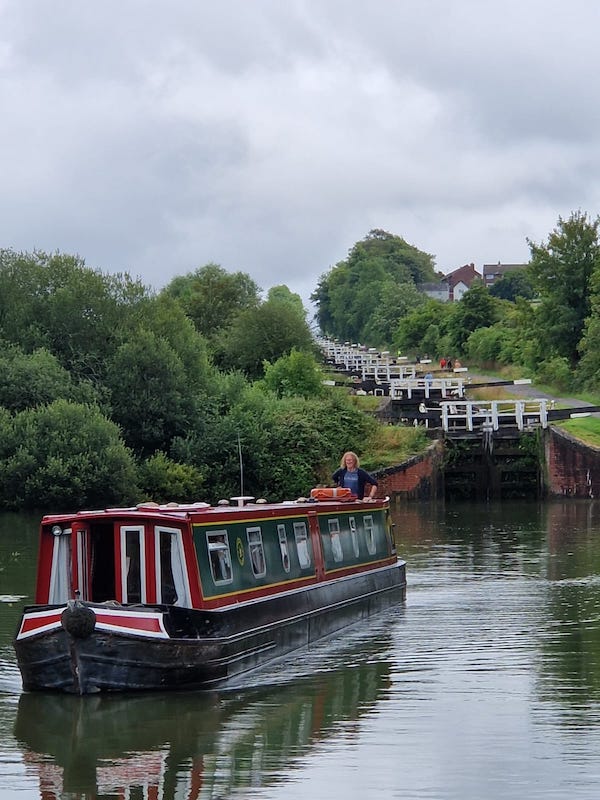Statement from the new BAAL Chair (2024-2027): Caroline Tagg

Hello to all BAAL members. I hope you can make me out in the above photo, taken on a recent family holiday on the canal between Reading and Bath in southern England. It shows me driving our hired narrowboat triumphantly away, having descended a flight of locks. I can heartily recommend a break on Britain’s canals – either narrowboating, canoeing, walking or cycling – as a welcome change of pace from a hectic academic working life. It’s something I’ve done with family over the past decade.
When I’m not captaining a narrowboat, I’m a Senior Lecturer in Applied Linguistics at The Open University (OU), where I’ve worked since 2015 (following a fixed-term position 2009-2011). My main current role at the OU is Associate Head of Research and Scholarship in the School of Languages and Applied Linguistics, a uniquely pleasant management role that involves supporting colleagues in carrying out their research, as well as co-leading a REF panel and engaging with the external research funding landscape. My own research betrays my age – I am interested in how middle-aged adults, largely in their 40s and 50s, manage interactions through mobile messaging apps such as WhatsApp as part of their busy everyday schedules, and in developing ‘post-digital’ methodologies that look across people’s online and offline interactional encounters.
I’ve been a member of the British Association of Applied Linguistics (BAAL) since at least 2010, when I presented my work at the BAAL annual general conference in Aberdeen and an OU colleague encouraged me to stand for her former role on the BAAL Executive Committee (EC), that of Seminars Coordinator. I’ve very glad she did and that I took her advice. I went on to serve a term as Seminars Coordinator (2010-2013) and then took up roles as SIGs Coordinator (2015-2018) and most recently as Secretary (2019-2024).
In these roles, I’ve had the privilege of working with several former chairs and other EC colleagues who take on these roles alongside their institutional commitments, teaching workloads and research careers. I’ve been inspired and motivated by their commitment to the applied linguistics community, their can-do attitude, and willingness to cheerfully volunteer for extra work. I shouldn’t be surprised by this, because this is how all academia works – alongside the tasks we have to do, we all take it upon ourselves to cover for each other, review each other’s work, engage with each other’s research findings, and assess each other’s students. It is in this spirit of collaboration and service that I step into the role of BAAL Chair.
I am both delighted and humbled to take on this important role. My immediate aim will be to lead the EC in revisiting and building on the strategic priorities which have shaped and inspired BAAL’s activities over recent years: promoting multilingualism; developing an international outlook; supporting the membership; ensuring equality, diversity and inclusion; and engaging with and influencing the UK government and higher education (HE) policies. All five priorities remain relevant as the decade progresses; but, from our perspective in late 2024, some emerge with greater urgency.
It is proving to be a turbulent decade, with the UK university sector recovering from the Covid-19 pandemic and now reeling from cuts to funding and resources, course closures, immigration restrictions and institutional deficits. Against this backdrop, the need to advocate for applied linguistics came across strongly from responses to the BAAL 55th Anniversary Survey of 2022, chiming with our priorities around engaging with and influencing the UK government. To address challenges facing the sector and promote our discipline, we must harness our strategic alliances with other UK associations, including the Academy of Social Sciences (AcSS), the University Council of General and Applied Linguistics (UCGAL) and the Linguistics Association of Great Britain and Northern Ireland (LAGB), as well as our own Committee for Linguistics in Education (CLiE).
If the HE environment looks challenging, applied linguistics itself has never been more diverse and exciting; our potential to effect lasting change and achieve social justice never greater. Supporting members to carry out such important work remains core to BAAL’s remit as a learned society, including through the increased opportunities for mentoring and networking mentioned in BAAL’s survey. With over 1400 members from across the UK and beyond, and around 20 special interest groups (SIGs), BAAL has a richly diverse membership in terms of sub-disciplines, research approaches, backgrounds, experiences, career stages, non-academic commitments, abilities, and perspectives on the world. Our aim must be to create a yet more inclusive and engaging association which welcomes and is relevant to an increasingly diverse range of scholars, educators, students, researchers, publishers and charities with an interest in language and applied linguistics. Please get in touch if you’d like to talk about how best we can do this.
If BAAL were a boat, it would be on choppier waters than that found in any British canal, but operated by an ambitious, competent crew steering towards a better future.
All the very best for the year ahead and for all your goals and ambitions. The newly configured EC and I look forward to working with you and seeing you at various BAAL events!
